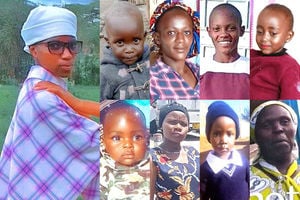Plan on county cash sharing out

PHOTO | BILLY MUTAI
Planning Minister Wycliffe Oparanya speaking while he opened the three-day 20th Institute of Certified Public Accountants (ICPAK) economic symposium at Hilton Hotel in Nairobi on February 22, 2012.
What you need to know:
- Population, poverty levels and region size to determine revenue allocation
The Commission on Revenue Allocation on Wednesday made public proposals on how Sh150 billion meant for counties would be shared.
Speaking during a forum organised by the Institute of Certified Public Accountants of Kenya, the commission chairman, Mr Micah Cheserem, said that five key areas will be considered in sharing out the cash.
He said between 15 per cent and 20 per cent would be shared equally by the 47 counties while between 50 and 70 per cent would be determined by population.
Mr Cheserem added that between 10 and 20 per cent would be allocated according to poverty levels.
He explained that between three and eight per cent would be allocated according to region size.
Another 0.5 per cent will be for marginalised counties, to be known as equalisation fund.
The system will seek to reward counties that show better financial management by allocating between one per cent and two per cent for fiscal responsibility.
“The threshold will hold for three years, after which a review will be done and those with good financial management record will get higher (rates) at five per cent,” he said.
At the same time, Prime Minister Raila Odinga cited generation of revenue as the major challenge county governments would face once they come into place after the next election.
Mr Odinga said that although the devolved units would have avenues to seek help from the national government, they had to work towards being self-sustaining.
“In promoting good governance and accountability, it is an indisputable necessity that these institutions be empowered and prepared to be of service to county governments as from their nascent stages. We must walk together to achieve this dream. As professionals you must take the lead in all ways to ensure that the original spirit that inspired the reforms is not lost,” Mr Odinga said in a speech read for him by Planning Minister Wycliff Oparanya during the forum at the Hilton Hotel in Nairobi on Wednesday.
According to the Constitution, the national budget should allocate 15 per cent of revenue directly to the 47 counties and the revenue allocation commission is charged with sharing out these funds.
Mr Cheserem said the commission would meet on Friday to finalise the revenue allocation method to be taken to Parliament for approval.
The PM said that the constitution provides that county governments should have reliable, stable and predictable sources of revenue to enable them to effectively perform their constitutional functions and to deliver services within their jurisdictions.
Mr Odinga added that devolution would help the government secure its dream of fostering equitable distribution of resources and an even pace of growth and development throughout the nation. He challenged professionals to take up the role of managing County Governments as a way of promoting effective financial management.
According to the Constitution, the national budget should allocate 15 per cent of revenue directly to the 47 counties and the revenue allocation commission is charged with sharing out these funds.
Mr Cheserm said the five areas will determine how Sh150 billion will be shared among the 47 counties.
The commission, he said, will meet on Friday to finalise the method that is expected to be taken to Parliament for approval.
This is likely to draw of debate as some leaders have already disputed the poverty index used in allocating Constituency Development Fund.
Some MPs have already demanded a new survey on poverty levels in the country. Also contentious is the 2009 population census results in parts of North Eastern which were said to be inconsistent with the trends. Planning minister Wycliffe Oparanya on Tuesday told parliament that the numbers had been corrected through statistical methods that are acceptable internationally. The correction found a discrepancy of 885,247 people.
Mr Cheserem said some communities in the Kajiado county had already protested at the indication that theirs was the wealthiest in the country.
“The criteria will be easy for anybody to understand. People will be able to calculate how much their areas are entitled to. We are consious of their concerns but we must avoid a situation where every body says their area is poor,” he said. He said poverty was highest in Turkana, where there were limited social facilities.
A senior economic advisor at the ministry of finance, Mr Kamau Thugge, said the Finance Bill was complete after the disagreements between the Treasury and local government were ironed out.
“The sub- committee of the Cabinet has approved the Bill and will be published today or tomorrow to beat the Monday deadline,” Mr Thugge said.
He said the Bill has ensured there is full disclosure, public participation and legislative oversight at both central government and the counties.
The budget at both levels of government will seek to maintain a stable economic environment, low inflation, stable interest and exchange rates.




